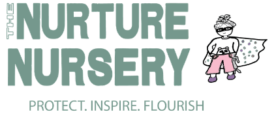Schematic Play
The Nurture Nursery has recently undertaken training on schematic play. We were taught how to spot schemas in children and then how to help the children further develop these schemas in their play to enrich their learning through playing the way they know how.
So, what are schemas and schematic play?
Schemas are behaviours that children go through when they are exploring the world and trying to find out how things work. Children have a very strong drive to repeat actions, move things from one place to another, cover things up, put things into containers, move in circles and throw things. It’s those repetitive actions that we as adults sometimes feel the need to stop as they can often seem trivial, pointless or even irritating to us, but they are so significant to a child’s learning.
Each child is different, and some may display more than one schema while others show none at all. Understanding schemas can help us to provide what children need for their learning.
There are a lot of different schemes but the most common are: – Connecting; glueing, threading, construction. Children displaying the connecting schema like to join things together, create patterns, make things bigger, longer or different shapes. – Enclosing; often seen in block play. Children show interest in enclosed spaces, they construct fences/ barricades around themselves or their toys. – Enveloping; covering, wrapping, hiding or swaddling themselves, other children or toys/ items. – Rotating; twisting, turning, whirling, winding, round and round. – Trajectory; interest in running water, throwing, “again, again”, discovering things that move, how they move, why they move. One of the earliest schemes observed in babies, throwing toys or food out of highchairs, cots to see where and how they will land. – Transporting; carrying things from place to place, usually in a bag, toy car or basket. – Orientation; seeing things from a different view, upside down, to the side, with one eye, through other things like tubes or toys to get a different perspective.
The role of the adult in this is to observe, respond and be led by children’s actions and creativity. Young children really benefit from opportunities to repeat and practice different actions, this helps their brain development and learning. We as practitioners look out for schemas in children, finding out what a child has/uses as a certain schema in their nursery day means we can give the child opportunities to widen their experiences and allow them to develop their knowledge on different things through playing the way they prefer and the way they enjoy the most. If a child is doing things their way, they are more likely to engage in more meaningful learning and development of the brain. What you as a parent can do to help your child is to watch closely and notice the patterns of your child’s play. You can give them other activities and toys that match that schema, which will hold their interest as well as help them with the stage of development that they are currently working through. For example, if your child likes to climb into the washing basket or wrap themselves up they are enclosing. Offer them a box to explore or build a den with them, wrap up or dress their dolls. If your child likes to put things into a bag/ basket and take it from place to place they are transporters, offer a role-playing game about packing for holiday or going to the shops, set up a tray with bowls and rice/dry pasta and give them spoons to allow them to explore using different utensils to transport.
Your child will lead you by showing you their interest, if you build on that interest you will keep finding new ways to offer more activities.
We are here to talk, go to your child’s key person or any other staff member if you have any questions we can always point you in the right direction!











